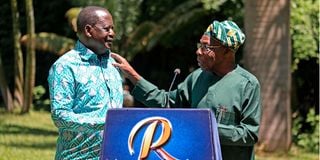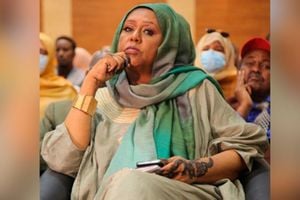
Azimio la Umoja leader Raila Odinga (centre) addresses journalists at SKM Centre in Nairobi on March 5, 2024. He is flanked by Wiper Party leader Kalonzo Musyoka (left) and Jubilee Party Secretary-General Jeremiah Kioni (partially hidden).
Opposition leader Raila Odinga faces a fresh hurdle in his bid to be the next Africa Union Commission (AUC) chair, with legal drafters at the institution proposing that only female candidates can run in the upcoming elections.
The Kenyan government has backed Mr Odinga’s quest to replace Chadian diplomat Moussa Faki Mahamat.
But a proposal circulated to member states on Tuesday suggested that only women should be eligible, even though the seat will still be reserved for the eastern Africa region in the next rotation.
The proposal is contained in the revised draft report on Preparations for the Election of Senior Leadership of the African Union Commission in February 2025.
The report is the work of the AU’s Legal Counsel and the Deputy Commission Chairperson’s Office, in conjunction with the Committee of Permanent Representatives, which must be submitted to the African Union Executive Council for approval before it is adopted by the Assembly.
It argues that the positions of chairperson and deputy chairperson must be restricted to the principle of gender parity, meaning that holders cannot be from the same gender at any given time, a practice introduced in 2021.
But it also argues, for the first time, that an incumbent of one gender should be replaced by an opposite gender at subsequent elections.
“In order to uphold the principle of rotational gender parity, it has been concluded that the next chairperson of the commission should be a female, while the next deputy chairperson should be a male,” the report says.

Azimio la Umoja leader Raila Odinga (left) with former Nigerian President Olusegun Obasanjo in Nairobi on February 15, 2024.
There has been only one woman chairperson in the history of the African Union — South Africa’s Nkosazana-Dlamini Zuma, who served one term between 2012 and 2017.
Until 2021, there was no restriction on the deputy chairperson even though the rotation practice was often that the deputy did not come from the same region as the chair.
Dr Zuma was deputised by Kenya’s Erastus Mwencha while Faki’s deputy in his first term (2017-2021) was Ghana’s Thomas Kwesi. He is currently deputised by Rwanda’s Monique Nsanzabaganwa. The elections are due in February next year.
The report will be tabled on March 16 before the Executive Council, comprised of foreign ministers from member states, to decide if the proposals are suitable.
Prime Cabinet Secretary and Cabinet Secretary for Foreign and Diaspora Affairs, Musalia Mudavadi, will represent Kenya at the council that often decides based on consensus.
While rotation has been generally opposed, some countries, especially in West Africa, have resisted it, according to sources who spoke to Nation.
After the first draft of the report was circulated to members last month at the AU Summit, a West African country was a vocal opponent, suggesting instead that the rotation should be restricted to the positions of chairperson and deputy chairperson, while competition for the six other commissioner seats should be open.
The new proposal suggests “partial restriction” such that, while the chairperson and deputy chairperson can be rotational; the six commissioners should freely compete. It adds that commissioners eligible to compete should re-enter the race for their positions, subject to a nomination by a special panel created to vet candidates in their region.
According to the 2018 decision on rotation, the next chairperson should come from eastern Africa, based on the ranking of regions per their alphabetical order in English.
Kenya and Rwanda are the only countries to have held the deputy chairperson seat since the African Union was created in 2002. Tanzania held the secretary-general post at the Organisation of African Unity, the precursor to the AU.
An earlier draft of the report had said countries that had held chairperson or deputy chairperson seats in the past cannot run for these positions until their peers in the region have had a bite at the cherry.
The proposed rules limit eligibility only during the AU times, which means Tanzania and others in the eastern region may be eligible to nominate candidates.











